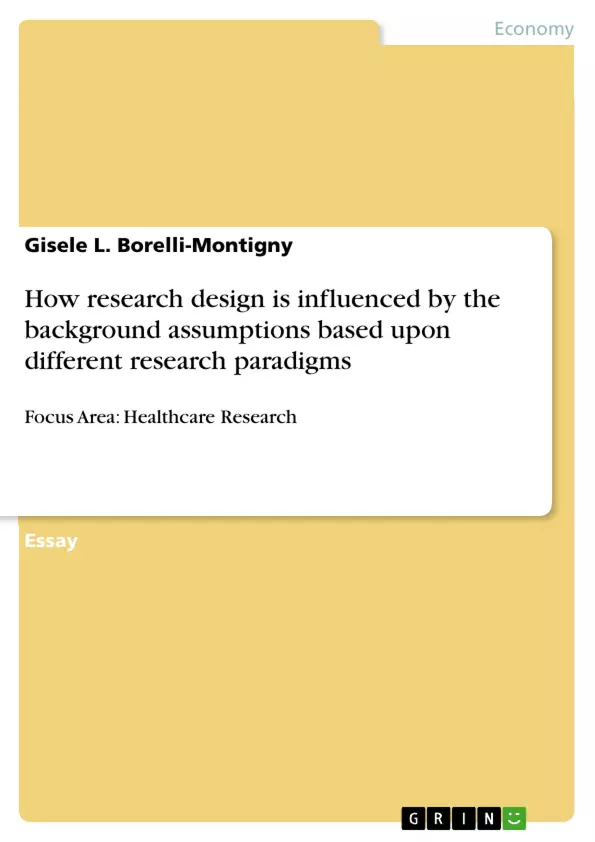Science, from the Latin "scientia", means knowledge. Furthermore science represents a social subsystem, which aims the production of intelligence and knowledge. This system uses observation and experimentation to describe and explain natural phenomena, through a process called scientific research. This process bases on searching and processing information, according to established procedures and aims fundamentally to contribute to generation and evolution of human knowledge in all sectors. Research will be called scientific if its realization is subject of a planned investigation, whose development is drafted according to methodological standards, as required by science.
Similarly, management research also focuses on knowledge production. It intends ...read more
Table of Contents
- Introduction
- Research Design
- Research Paradigms
- Healthcare Research
Objectives and Key Themes
This text aims to explore how research design is influenced by underlying assumptions rooted in different research paradigms, particularly within the context of healthcare research. It examines the interplay between research questions, available resources, and researcher expertise in shaping research design choices.
- The influence of research paradigms on research design.
- The relationship between research questions and methodological choices.
- The practical constraints (funding, time, researcher expertise) influencing research design.
- The contrasting perspectives of positivism and interpretivism-constructivism.
- The application of research paradigms in healthcare research.
Chapter Summaries
Introduction: This introductory chapter establishes the context of scientific research, emphasizing its role in knowledge production across various fields, including management and healthcare. It highlights the importance of identifying feasible research problems and selecting appropriate research designs based on desired outcomes and practical considerations. The chapter lays the foundation for the subsequent discussion of research paradigms and their impact on research design by emphasizing the systematic and methodological nature of scientific inquiry.
Research Design: This chapter delves into the factors that influence research design, primarily focusing on four key points: the research question, available funding, time constraints, and researcher competence. It underlines the importance of choosing a design that aligns with the research question and available resources, ultimately contributing to the reliability and validity of the study. The chapter subtly introduces the concept of paradigm influence, setting the stage for a more in-depth exploration in subsequent chapters.
Research Paradigms: This chapter provides a detailed comparison of two major research paradigms: positivism and interpretivism-constructivism. It explores the epistemological differences between these paradigms, highlighting the positivist emphasis on observable phenomena and the interpretivist-constructivist focus on subjective meanings and multiple realities. The chapter also discusses the potential for combining paradigms to broaden the scope of a study, acknowledging the importance of developing convincing arguments to support research findings regardless of the chosen paradigm.
Healthcare Research: This chapter focuses on the application of research paradigms within the context of healthcare research. It addresses the challenges and complexities inherent in this multidisciplinary field, emphasizing the need for diverse perspectives and rigorous evaluation methods to enhance the reliability and validity of research findings. The chapter highlights the growth of healthcare services and the associated problems, such as cost containment and quality improvement, framing the need for robust and relevant research methodologies within this field. The constructivist perspective is highlighted as one lens through which to understand the complex realities of healthcare research.
Keywords
Research design, research paradigms, positivism, interpretivism-constructivism, qualitative methods, quantitative methods, healthcare research, epistemology, methodology, mixed methods.
Frequently Asked Questions: A Comprehensive Language Preview
What is the purpose of this text?
This text explores the influence of research paradigms on research design, particularly within healthcare research. It examines how research questions, available resources, and researcher expertise shape methodological choices. The text also contrasts positivist and interpretivist-constructivist perspectives and demonstrates their application in healthcare settings.
What are the key themes covered?
Key themes include the impact of research paradigms on design, the relationship between research questions and methodology, practical constraints influencing design (funding, time, expertise), a comparison of positivism and interpretivism-constructivism, and the application of these paradigms in healthcare research.
What research paradigms are discussed?
The text focuses primarily on positivism and interpretivism-constructivism, highlighting their epistemological differences and potential for combined use in research studies. It emphasizes the importance of justifying research findings regardless of the chosen paradigm.
How does the text address healthcare research specifically?
The text examines the application of research paradigms within the complexities of healthcare research, acknowledging the need for diverse perspectives and rigorous evaluation methods. It highlights challenges like cost containment and quality improvement, underscoring the need for robust research methodologies in this field. The constructivist perspective is given particular attention within this context.
What are the main chapters and their content?
The text includes an introduction setting the context of scientific research and emphasizing the importance of appropriate research design. A chapter on research design itself discusses influencing factors like research questions, funding, time, and researcher competence. A chapter on research paradigms provides a detailed comparison of positivism and interpretivism-constructivism. Finally, a chapter on healthcare research explores the application of these paradigms within the healthcare field and its specific challenges.
What are the key takeaways from each chapter?
Introduction: Emphasizes the systematic and methodological nature of scientific inquiry and the importance of selecting appropriate research designs. Research Design: Highlights the alignment of design with research questions and resources for reliable and valid studies. Research Paradigms: Contrasts positivism and interpretivism-constructivism, emphasizing epistemological differences and the possibility of combining paradigms. Healthcare Research: Underscores the need for diverse perspectives and rigorous methods in healthcare research due to its complexities and challenges.
What keywords are associated with this text?
Keywords include research design, research paradigms, positivism, interpretivism-constructivism, qualitative methods, quantitative methods, healthcare research, epistemology, methodology, and mixed methods.
For whom is this text intended?
This text is intended for academic use, supporting the analysis of research themes in a structured and professional manner. It provides a comprehensive overview suitable for students and researchers interested in research methodology and its application in healthcare.
- Quote paper
- Dr. Gisele L. Borelli-Montigny (Author), 2010, How research design is influenced by the background assumptions based upon different research paradigms, Munich, GRIN Verlag, https://www.hausarbeiten.de/document/153465


